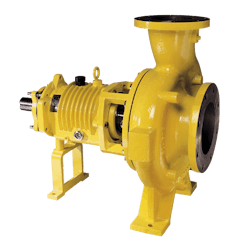Many chemical and polymer plants must employ phenol in their production processes. Also known as carbolic acid, phenol is made from petroleum-derived feedstocks. A total of 15.4 billion pounds of the material are used worldwide annually in the manufacture of such diverse end products as epoxies, detergents, herbicides, cosmetics, sunscreen, aspirin and numerous pharmaceutical drugs.
While phenol is indispensable in the production of many common products, it requires careful handling because it can cause extremely painful chemical burns if it comes into contact with skin. In addition to its potentially dangerous nature, phenol can be a tough fluid to control because of its innate characteristics. Specifically, phenol freezes at a high temperature, usually around 90ºF, and as it works to reach that temperature, it will begin turning into a slushy liquid, which will cause the pump being used to transfer it to stop working. This means that steam jacketing on the pump and its piping will likely be required to prevent the phenol from crystallizing and freezing, which, in addition to halting pump operation, makes it difficult to remove.
The handling and transfer of phenol — along with most other chemicals and polymers — requires the use of a pump technology that not only optimizes flow rates and stays above a certain temperature, but also prevents dangerous leaks and spills. In many cases, sealed ANSI centrifugal pumps have been the technology of choice for these types of operations. The drawback in using these basic types of centrifugal pumps revolves around the mechanical seals, which can fail for several reasons. The most obvious is that any type of vibration or radial load that the pump experiences during operation will compromise the integrity and lifespan of the seals.
These seals can cost $3,000 apiece, and if they need to be changed three to four times a year, that is an ancillary cost that is not easy for the plant to recoup. Additionally, since phenol is hazardous, if the pump needs to be serviced it must be flushed and decontaminated before it can be worked on, a process that could see the pump idled for upwards of 8-10 hours.
Some operators may choose to use a seal-less pump when handling phenol, such as a canned-motor pump, but this type of technology also has its shortcomings. Namely, if the pump cavitates during operation, or if the viscosity of the liquid increases — which is always possible with phenol — the pump’s rotor will come out of alignment, leading to a catastrophic failure.
An alternative is the LD17 Series Centrifugal Pump from Blackmer. Blackmer offers 11 models of LD17 pumps, all of which have been designed around the seal, where 90% of pump failures occur. The LD17 pumps also feature a stiffer, heavy-duty shaft and larger bearings, which helps prevent common vibration damage while delivering the widest operational window off the pump’s Best Efficiency Point (BEP). They can achieve flow rates as high as 1,400 gpm (320 m3/hr). An additional option for applications that feature high-temperature liquids is the 11-model Frame A or 4-model Frame M High Temperature Series Pumps. These pumps allow the handling of materials with maximum temperatures of 450ºF with the 450ºF Line, 650ºF with the 650ºF Line and even up to 750ºF with additional configurations and factory consultation, which is well above the 400ºF temperature limit for standard Frame A and Frame M models.
Competition
Other ANSI centrifugal pumps: Many common models of centrifugal pumps are prone to developing leaks around their seals, which creates maintenance, cleanup, remediation and safety concerns for plant operators. Common centrifugal pumps are also prone to extreme vibration when run at high speeds, which leads to noisy operation and premature pump wear that can result in breakdowns and associated downtime that will affect the overall production process.
Canned-motor pumps: Since these pumps do not have mechanical seals, they rely on the process fluid to lubricate and cool the pump’s rear bushings. This design can be problematic if the pump experiences excessive cavitation or the liquid increases in viscosity, which means the rear bushing will not be adequately cooled. When this happens, the bushing cannot support the full weight of the pump rotor and if the rotor gets out of alignment, the displaced shaft will tear apart the interior of the pump, resulting in a catastrophic failure.
From the field
In 2016, a plant in the northeast United States that produces phenol experienced recurring mechanical seal failures with its centrifugal pumps.
The pump was in a back corner of the facility and was being used to transfer any off-spec phenol that was produced to a “bottoms” tank, from which it would be pumped back into the production process as needed, typically at a rate of 1,000-8,000 pounds per hour.
Because the phenol would turn slushy if it was allowed to approach its 90ºF freezing temperature, it would cause vibration and radial deflection of the pump’s impeller and shaft, which would lead to seal damage.
Because the pump was situated in an isolated area of the plant, the chances were high that if a seal leak did occur, it would go undetected for several hours or days. If these leaks occurred in the winter, the phenol would freeze solid, while a summertime leak would result in the pooling of a slushy liquid in the area. Either way, it would be difficult to clean up, in addition to posing a health hazard since phenol can cause chemical burns if it touches bare skin.
After tiring of the leaks and the need to replace expensive seals three to four times a year, the operator, which had previous positive experiences using Blackmer Centrifugal Pumps in other liquid-handling applications, replaced the ill-performing centrifugal pump with a Blackmer LD17 Series model. The new LD17 pump outfitted with double mechanical seals was installed in 2017 and has operated flawlessly since then, with not a single leak incident reported or need to change out any of the seals.
Chris Hordyk is a product manager for Blackmer. He can be reached at [email protected]. Based in Grand Rapids, Michigan, Blackmer is the leading global provider of sliding vane, gear, regenerative turbine and centrifugal pump, and reciprocating compressor technologies for the transfer of liquids and gases. Blackmer is a brand of PSG, a Dover company. You can find more information on Blackmer at blackmer.com and on PSG at psgdover.com.



